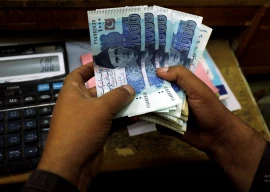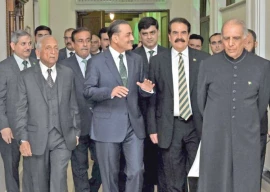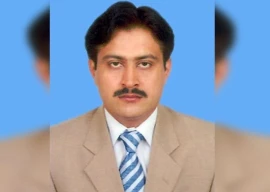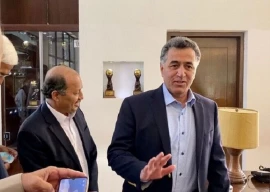
Unimpressed with the work of UK economist Stefan Dercon, Prime Minister Shehbaz Sharif has delegated the responsibility of developing the "home-grown economic development plan" to Deputy Prime Minister Ishaq Dar.
According to a notification, the premier has constituted a seven-member ministerial committee, chaired by Dar, to review the draft of the Dercon Plan.
The draft of the foreign-funded plan, which was reported by The Express Tribune on Sunday, largely reiterated ideas already well known to the public. Lt General Sarfraz Ahmad, the national coordinator of the Special Investment Facilitation Council (SIFC), will also serve as a member of the newly formed committee.
Other members of the committee include Planning Minister Ahsan Iqbal, Finance Minister Muhammad Aurangzeb, Minister for Economic Affairs Ahad Khan Cheema, Minister of Information Atta Ullah Tarar, and Minister of State for Finance Ali Pervaiz Malik.
The prime minister's decision to hire a foreign economist has drawn strong criticism from independent economists and analysts. Some believe that Pakistan should not have given Dercona UK economistsuch significant importance by providing him with direct access to the prime minister and cabinet ministers.
Stefan Dercon had prepared the draft of Pakistan's "home-grown" growth agenda under the supervision of Finance Minister Muhammad Aurangzeb, who chaired the initial committee on the economic plan.
According to the PM's Office, Dercon is a policy advisor to the UK's Foreign Commonwealth and Development Office (FCDO). However, the UK High Commission in Islamabad has clarified that he is a former advisor to the FCDO.
"There is nothing new or extraordinary in Stefan Dercon's plan," a senior cabinet member commented during one of the meetings held to review the draft. This led the government to establish the Dar-led committee with the mandate to critically review the plan. Ishaq Dar is currently heading nearly two dozen committees, mostly dealing with economic issues and managing relations with political allies.
Although the committee's primary task is to review the Dercon Plan, it has decided that the government's economic strategy will be rooted in the Pakistan Muslim League-Nawaz (PML-N)'s election manifesto and existing government plans, according to a committee member.
Dar chaired the committee's first meeting on Friday, during which it was decided that the Dercon Plan would be reviewed in light of the PML-N's election manifesto and the Planning Commission's 5Es framework. Many believe there was no need to engage Dercon, as the country has already entered into a three-year International Monetary Fund (IMF) programme.
The committee will also incorporate feedback from stakeholders and meeting participants to ensure the draft plan is robust, cohesive, and free from inconsistencies, according to the notification. The government appears to have found inconsistencies and a lack of cohesion in the draft plan.
The notification further states that the committee will align sectoral plans with the principles of the home-grown economic development plan. If necessary, the committee may re-engage Stefan Dercon for additional input.
Based on the work of the Dar committee, the prime minister will announce an economic plan for the remainder of his government, focusing on measures to reduce inflation to single digits.
Dercon has linked sustainable 6% annual growth and $60 billion in exports to the strict implementation of reforms and strong political will. However, the UK economist has not identified a "magic bullet" to fix Pakistan's economy.
The Dercon Plan stresses the need for more private investment, export orientation, and a shift away from import substitution, alongside sufficient tax revenue and control over public financespoints that have been reiterated by Pakistani economists and are mentioned in multiple government reports.
The PML-N had also unveiled a cautiously optimistic economic manifesto before the general elections, aiming to strike a balance between public expectations and the harsh realities of the country's financial situation.
The PML-N pledged to bring inflation down to single digits by the end of fiscal year 2025, with the goal of further reducing it to an affordable range of 4% to 6% by 2029. Inflation in July was recorded at 11.1%. The PML-N also promised to reduce poverty from nearly 40% to less than 25% within five years, lifting approximately 40 million people out of poverty. The party planned to achieve this through an annual GDP growth of 6% and a single-digit inflation rate.
Additionally, the PML-N vowed to increase the economic growth rate by 1% each year during its first three years in power, targeting 4% GDP growth in the first year, 5% in the second, and 6% in the third year, maintaining this level for the following two years. The PML-N did not set aggressive targets for increasing Pakistan's low tax-to-GDP ratio. It has promised to raise the ratio from 10.4% to 13.5% by the end of 2029a 0.7% annual increase.



















COMMENTS
Comments are moderated and generally will be posted if they are on-topic and not abusive.
For more information, please see our Comments FAQ